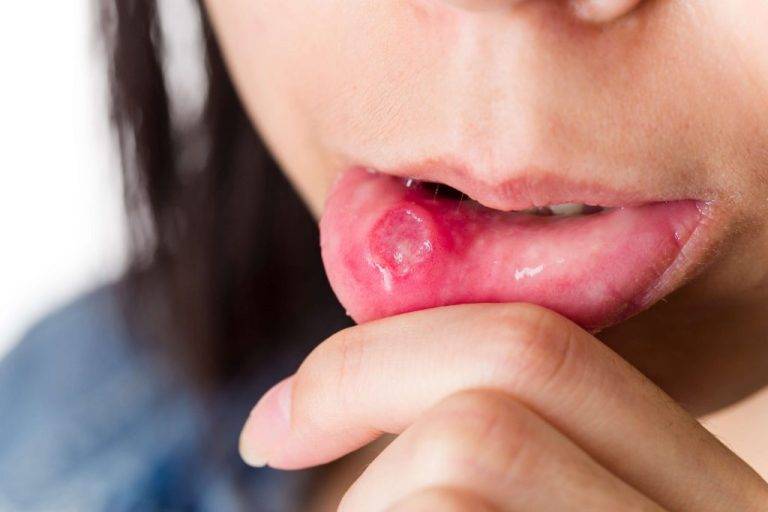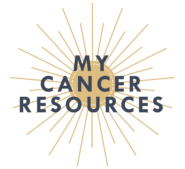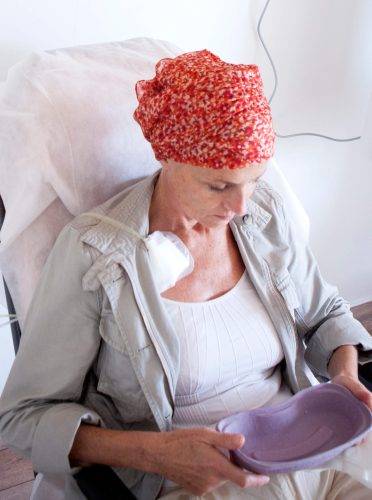
My Cancer Resources is reader-supported. When you buy through links on the site, I may earn a small affiliate commission, at no cost to you. As an Amazon Associate, I earn from qualifying purchases.
Mouth sores are a common side effect of cancer treatment. From small red spots to large ulcers that cover the entire inside of the mouth, these painful sores can make it difficult to talk, swallow, eat, drink, and sometimes even breathe. Here we’ll discuss what mouth sores from chemo are, how they develop and to how to prevent and treat them.
What are Cancer-Related Mouth Sores?
Mouth sores are also called oral mucositis or stomatitis. Mucositis is a term that refers to inflammation or ulcers of the mucous membranes that are all along the gastrointestinal (GI) tract, such as the esophagus, which carries the food that is swallowed down to your stomach.
Stomatitis or oral mucositis is the inflammation and ulcers that occur throughout the mouth, such as in the gums, cheeks, on or under the tongue, on the roof of the mouth, throat, and lips. Because mouth sores occur in an area where there are many nerves (the lips and the tongue), they can be quite painful. Sometimes mouth sores can also become infected.
Mouth sores can appear approximately 1 to 2 weeks after cancer treatment starts and mild cases may resolve in a couple of days to a week. Sometimes mouth sores will come and go when treatment is given in cycles.
Which Cancer Treatments Cause Mouth Sores?
Cancer treatments that can cause mouth sores are:
- Radiation therapy aimed at the head and neck
- Targeted therapy
- Immunotherapy
- Stem cell transplant, which is also known as a bone marrow transplant
- Chemotherapy
Chemotherapy and Mouth Sores
Chemotherapy drugs that are more likely to cause mouth sores include:
- Cisplatin
- Capecitabine
- Etoposide
- Doxorubicin
- Cytarabine
- Fluorouracil
- Methotrexate
Why Does Cancer Treatment Cause Mouth Sores?
Cancer treatment is designed to kill fast-growing cells in the body. Unfortunately, the medicine or radiation cannot know which cells in the body are cancer cells, and which are healthy cells. This means that cancer treatment can kill the healthy cells that work to protect, such as the mucous cells in the lining of the mouth and throat.
Treatments also prevent the cells in your mouth from regenerating and repairing themselves once they are damaged. This can make it more difficult to treat mouth sores if they are left unchecked.
Treatments can change the mouth’s microbiome. When the balance between good and bad bacteria in your mouth is thrown off, an infection can develop. Cancer treatments can also suppress the immune system, making it more difficult to fight off infection, leading to mouth sores.
If you’ve had a stem cell transplant, mouth sores can be an indicator that you’ve developed graft-versus-host-disease, also known as GVHD. This is when the original cells in your body do onot recognize the transplanted cells and think they’re harmful. The original calls then attack the transplanted cells in an attempt to protect your body.
What are the Symptoms of Mouth Sores?
Mouth sores usually develop over a period of several days. The first sign is often a tingling or burning sensation in the mouth. This is followed by the appearance of spots or cuts in the mouth, which can be red, or have tiny white patches in the middle. These spots may bleed, grow into ulcers, or become infected.
Other symptoms include:
- Swollen gums, mouth, or throat
- Discomfort or pain with chewing and/or swallowing
- Increased discomfort when eating hot and cold foods
- Increased mucus or white/yellow film in the mouth or on the tongue
If you are experiencing any of these symptoms, it is important to talk to your medical team right away before the sores multiply or become more painful, which could lead to decreased eating, dehydration, and/or weight loss.
How to Prevent Mouth Sores
There are several things you can do to lower the risk of developing mouth sores.
Preventative Dental Care
Ideally about four weeks before starting cancer treatment, visit the dentist to check on the health of your teeth and gums. If you have any conditions such as cavities, gum disease, or broken teeth, these should be addressed prior to starting treatment. If left untreated, infections can develop. Infections can make cancer treatment-related mouth sores more difficult to treat.
Stop Smoking
Smokers are at a higher risk of developing mouth sores because the lining of the mouth and throat is already weakened. Cancer treatments can destroy the lining of the mouth and throat much faster in smokers, meaning sores can develop faster and be much worse for smokers than non-smokers.
Keep Your Lips and Mouth Moist
Dry mouths are more prone to infection, so it is important to keep your lips and mouth clean and moist by:
- Applying lip balm regularly (avoid any open wounds if sores are on your lips)
- Sucking on hard sugar-free candies or chew sugar-free gum, as both can stimulate your salivary glands to produce more saliva
- Drinking a lot of fluids, especially water
- Using a soft toothbrush to gently brush your teeth and tongue twice a day. As long as you don’t have low platelets and your healthcare provider says it’s ok, gently floss once a day with unwaxed floss.
- Rinsing your mouth every couple of hours when you’re awake with water. Swish the water around for a couple of minutes, then spit it out.
- Using products specially designed to keep the mouth moist, like this toothpaste, mouth rinse and mouth spray.
Prevention Prior to Treatment
Your doctor may recommend an oral rinse to use before and after each treatment to prevent infection.
Swishing ice chips or cold water around in your mouth during certain types of chemotherapy treatment might be recommended, as the cold limits the amount of chemotherapy drugs that reach your mouth, which can reduce your risk of developing mouth sores.
Avoidance of Certain Foods and Products
Avoid the following, which can dry out and/or irritate your mouth:
- Mouthwash that contains alcohol
- Foods that are spicy, hot, salty, or have rough textures or edges, such as pretzels, chips or popcorn
- Acidic foods or juices such as tomatoes, lemons, limes, oranges and grapefruit.
- Foods or drinks that are either very hot or very cold.
- Caffeinated beverages
- Alcohol
- Tobacco products
- Liquid medications that contain alcohol, such as some cough medicine should be avoided unless absolutely necessary.
Treatment for Mouth Sores from Chemo or Other Cancer Treatments
- Use a mouth swab instead of a toothbrush to clean your mouth.
- Waterpik water flossers can also be more gentle than flossing and can provide additional moisture in your mouth.
- Use an over-the-counter mouth sore rinse, such as Peroxyl after brushing
- Use a straw for drinking to keep liquids away from mouth sores
- Take ibuprofen or another pain reliever. Be sure to first check with your provider and follow the instructions on the package carefully so that you don’t take more than the recommended dosage.
- Use a mouth numbing agent like Orajel® or Anbesol® before meals
- Puncture a 400IU Vitamin E capsule and squeeze the liquid onto a mouth swab. Gently pat the open sores with the swab to promote healing.
- Milk of magnesia can be used to gargle with or applied to sores with a mouth swab.
- Sometimes antacids can help to reduce burning sensations.
- Prescriptions from your healthcare provider may include ‘magic mouthwash’, which is a combination of medications that can coat and soothe the mouth.
Natural Remedies to Prevent and Treat Mouth Sores
Home remedies for mouth sores include homemade mouth rinses. These can be used three to four times per day. Simply mix the ingredient(s) into water, gargle and swish in your mouth, and then spit it into the sink (do not swallow the mixture). Here are three ‘recipes’ that may help:
- 1 teaspoon baking soda dissolved in 2 cups water.
- ½ teaspoon sea salt and ½ teaspoon baking soda dissolved in water.
- Equal amounts of hydrogen peroxide and water
Oil pulling has also been recommended by a number of people with cancer to prevent and heal mouth sores. The way this works is to mix 1 teaspoon of unrefined, cold pressed, organic, extra virgin coconut oil with 3 drops of clove essential oil and 3 drops of peppermint essential oil. The coconut oil is solid at room temperature but will liquify when in your mouth.
Swish this mixture in your mouth for 20 minutes and then spit into the trash (otherwise the mixture can re-solidify and clog your drains). Follow with a saltwater rinse and spit that out.
It may take some time to build up to having that amount of liquid in your mouth and swishing for that long, so start by using half of the mixture and swish for as long as you can, extending the amount swished and length of time each day until you’re up to the full 20 minutes each day.
Natural herbs and extracts that are backed by scientific studies 1 demonstrating a reduction in the frequency and severity of mucositis include:
- Honey – manuka honey (Leptospermum scoparium) is an excellent option because it has antifungal, antibacterial and anti-inflammatory properties. Simply place the honey onto a mouth swab and apply it to the mouth sores.
- Matricaria chamomilla – this Chamomile rinse has been shown to prevent or delay onset and reduce the occurrence and severity of chemotherapy and radiation-induced mucositis.
Essential oils – a few blends have been studied:
- combining 1 drop of Melaleuca alternifolia (Tea Tree), 1 drop of Citrus bergamia (Bergamot), 1 drop of Pelargonium graveolens (Rose Geranium) and ½ cup of boiled warm water makes a gargle/mouth rinse that can be used 5 times a day and spit out.
- 10 drops of Mentha piperita (Peppermint) essential oil into boiled water and used as a rinse 3 times a day and spit out. Note that some individuals may be sensitive to the tingling sensation that peppermint has, and this mixture may be irritating to some users.
Before taking any herbs, extracts or herbal supplements, check with your provider to ensure there are not any drug interactions that can occur with these complementary therapies for mouth sores.
What to Eat or Drink When Experiencing Mouth Sores
It is important to eat a well-balanced diet full of nutrients while undergoing cancer treatment. High protein and high calorie foods are especially important. Foods that are soft, such as eggs, pureed foods, gelatin, puddings, and if you can tolerate cold foods, smoothies or chilled soups are good options. Protein shakes such as Ensure® or Boost ® can also work.
What a Cancer Patient Can Do
A person with cancer can check their mouth a couple times a day using a mirror and a flashlight, looking for any red or sore spots. Notify the treatment team if anything looks or feels different, or if there is tingling or burning in the mouth.
What a Cancer Caregiver Can D
Check the patient’s mouth twice a day if the patient is not up to doing their own examination. Use a flashlight to search for white patches or red areas.
Offer soft, mashed, or pureed food to eat.
If allowed, offer pain medication 30 minutes before meals.
What Happens if Oral Mucositis Becomes Severe?
Contact your doctor or health care provider if:
- The sores on your lips or in the mouth or throat interfere with sleeping, eating and/or drinking or taking medication
- Any sign of infection is observed on the lips, mouth or throat
- You have a temperature of 100.5 F (38 C) or more
- Pain continues or increases even after following the providers’ treatment recommendations
Mouth ulcers from chemo or other cancer treatments are a common side effect. Mouth sores can range in size from small red spots to large ulcers. There are some preventative measures you can take, and several things that you can do to ease the pain if sores develop. Practicing good oral hygiene, maintaining a nutritious diet while avoiding foods, drinks and other products that can irritate the mouth and throat and using medications to heal sores may minimize the intensity of the sores and speed up healing.
Please talk with your health care professional about your specific medical condition and treatments. The information throughout this website is meant to be helpful and educational but is not a substitute for medical advice.
Reference: Aghamohamamdi, A., & Hosseinimehr, S.J. (2016). Natural products for management of oral mucositis induced by radiotherapy and chemotherapy. Integrative Cancer Therapies, 15(1): 60-68.



